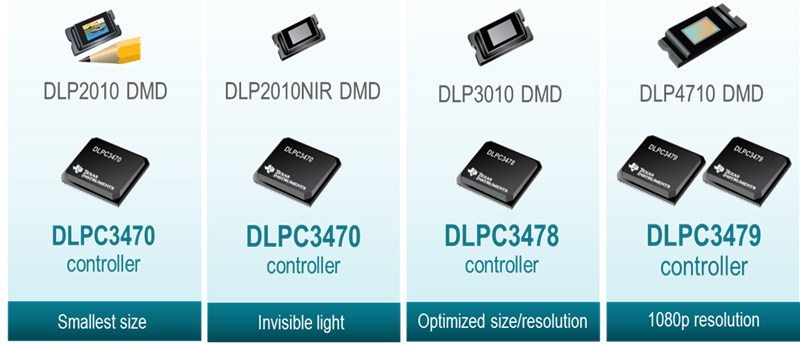SSZT670 july 2018 DLP2010 , DLP2010NIR , DLP3010 , DLP4500 , DLP4710 , DLP9000 , DLPC3470 , DLPC3478 , DLPC3479
The desire to differentiate is fundamentally human and is constantly on the rise. Personalization is becoming more and more important in our lives. Texas Instruments DLP® technology is continuously innovating in responding to these demands.
We get excited when we get that cup of coffee with our name personalized on it. People pay premium to have their names imprinted on the clothing that they wear. Now, imagine a ring that you wear with your name imprinted on it. Better yet, imagine a ring that is designed exactly as per your taste that matches with the clothing that you just bought at a store. Imagine a ring that is designed and built by you and not by someone in an unknown factory.
Such are the possibilities that could be realized with the new DLP Pico™ chipsets, which bring industrial performance to small, portable applications. Soon, consumers will be able to take a high-accuracy 3D image of their ring finger and design a ring that fits perfectly, and then use a 3D printer at a nearby store or at home to make the ring. For that matter, they could create multiple rings for multiple occasions – a formal business meeting, a sports game or a family vacation. Several other examples could be imagined, such as the customized phone cases shown in the Figure 1, customized toys, puzzles, home decor and many more – all symbolizing a new wave of “made by me” sense of satisfaction and pride.
 Figure 1 Real world example: Process to
customize a smartphone case
Figure 1 Real world example: Process to
customize a smartphone caseThe vision of capturing the real world in high-accuracy 3D, imagining new possibilities in 3D and creating real objects in 3D is here now, and is made possible with DLP technology. TI’s DLP technology is already proven in high-performance industrial 3D machine vision and 3D printing applications with its larger DLP DLP4500 and DLP9000 chips. When paired with one of four existing DLP Pico digital micromirror devices (DMDs), the new DLPC3470, DLPC3478 and DLPC3479 controllers create entirely new chipsets that enable a new generation of desktop 3D printers and portable 3D scanners with high-speed and high-resolution capabilities typically found in industrial-grade products. Different uses cases of portable 3D scanning and 3D printing are shown in Figure 2 and Figure 3, respectively.
 Figure 2 Sample Portable 3D scanning
applications
Figure 2 Sample Portable 3D scanning
applications Figure 3 Different possibilities with
3D printing
Figure 3 Different possibilities with
3D printingThe new controllers pair with DLP2010, DLP2010NIR, DLP3010 and DLP4710 DMDs ranging in size from 0.2 to 0.47-inches in diagonal and offer a scalable platform. The DLPC347x controllers are pin-to-pin compatible to existing DLPC343x display controllers and offer several additional features that benefit non-display light control applications that include 3D scanning and 3D printing. The controller and DMD mapping is shown in the table below.
| Chipset controller | Chipset DMD | Wavelength | Pixel array | Availability |
|---|---|---|---|---|
| DLPC3470 | DLP2010NIR | 700-2500nm | 854 x 480 | Now |
| DLPC3470 | DLP2010 | 400-700nm | 854 x 480 | Now |
| DLPC3478 | DLP3010 | 400-700nm | 1280 x 720 | Now |
| DLPC3479 | DLP4710 | 400-700nm | 1920 x 1080 | Now |
The family of four new chipsets range from small sizes up to larger chips that deliver 1080P resolution. These chipsets enable you to design a range of products from compact, battery-operated scanners and printers to high-performance prosumer products.
 Figure 4 DMD and Controller
Mapping
Figure 4 DMD and Controller
MappingThe real world around exists in three dimensions, and human eyes are naturally designed to see the world in 3D. With this new technology, you can now design smart scanning devices that can capture any object in 3D with high accuracy and provide a faithful representation in real-time. It is exciting to imagine the new ways of synthesizing this information and bring novel concepts into real-world tangible 3D objects. DLP technology can help you realize endless possibilities in a broad variety of applications across industrial, medical and consumer markets making our lives more efficient and more fun than ever before.
To get started, view the Small Form-factor Structured Light Pattern Generator Reference Design for Portable 3D Scanners.
Additional resources:
-
Learn more about 3D scanning and 3D printing at: http://www.ti.com/dlp-chip/advanced-light-control/applications.html
-
Read the white paper “High accuracy 3D scanning using Texas Instruments DLP® technology for structured light” :
- Check out the DLP2010 Light Control evaluation module and the DLP3010 Light Control evaluation module.